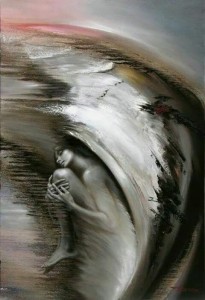Requiem


“The presence of pain is not the absence of love.” William Paul Young
Trying to comfort someone in the face of a great loss, I could only cry with her. Wanting to speak kindly as I left I could only say, “Just keep crying.” You know why? Because there is nothing else that can be done. He can’t be brought back. The house will never be the same again. The home will never be the same. The bed will never be the same. All the thousands of details of sharing her life with her spouse… Gone. The love he gave while he was here, remains. At some point the crying will stop and the memory of that love will allow life to move forward again. His beautiful daughter said it best, “What I am the most grateful for about you Dad, the way you loved me, will be what gives me strength to carry on.”
That was so sad, but it was beautiful. Listening to a family mourn the unexpected loss of their
dear one. They didn’t attempt to convince anyone that he was an angel on earth. No, he was fully human with all the foibles that entails. But he was good enough to make them all feel loved and special in their own right. He was faithful to his family, never giving up on any one of them as they showed their humanity. He was joyful and hardworking and steady as a rock. He was their rock. They all stated that having such a man in their lives is The Thing that will help them the most to go on without him.
In his book, Duino Elegies, Austrian poet Rainer Wilke declares:
“In the end, those who were carried off early no longer need us: they are weaned from earth’s sorrows and joys, as gently as children outgrow the soft breasts of their mothers. But we, who do need such great mysteries, we for whom grief is so often the source of our spirit’s growth––: could we exist without them?
He claims that “Grief is so often the source of our spirit’s growth.” As much as I despise it, I would have to agree. Still, the process is unnerving. And grief, of course, comes from a myriad of sources outside of death.
The psalmist who was betrayed expressed it this way:
“I am worn out from my groaning.
All night long I flood my bed with weeping and drench my couch with tears. My eyes grow weak with sorrow; they fail because of all my foes.” (Psalm 6:6.) It is SO much easier to get angry and ugly than to walk through those feelings.
James directs us to “grieve, mourn and wail” when we are the betrayer. Also, it is much easier to deny our missteps and wallow in blame towards God, the world or others.
Wilke, as poets do, sets the bar high. Not to be glad for grief, I believe, but to let it do its work in us.
“How I will cherish you then,
you grief-torn nights!
Had I only received you,
inconsolable sisters,
on more abject knees, only
buried myself with more
abandon
in your loosened hair. How we waste
our afflictions!
We study them, stare out beyond them
into bleak continuance,
hoping to glimpse some end. Whereas
they’re really
our wintering foliage, our dark greens
of meaning, one
of the seasons of the clandestine
year — ; not only
a season –: they’re site, settlement,
shelter, soil, abode.”
I don’t really know what the grief was in Ranier’s life. I do know that his ten elegies took him ten years to complete. The Duino Elegies was published just three years before his death. But in no way do I believe the emotions he expressed so well were exclusive to him, but relevant to all of us.
There is a larger message in Proverbs 1, but verse 27… Says when, not if.
“..when calamity overtakes you like a storm,
when disaster sweeps over you like a whirlwind, when distress and trouble overwhelm you..”
Reality proclaims, it will come. No life is trouble free and no person escapes grief. I wouldn’t say to “cherish” it, but to let it be a teacher through the tears.




Discussion